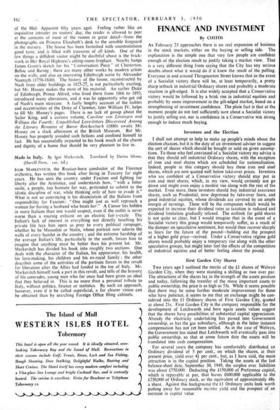FINANCE AND INVESTMENT
By CUSTOS
As February 23 approaches there is no real expansion of business in the stock markets, either on the buying or selling side. The explanation is the simple one that very few people are confident enough of the election result to justify taking a market view. That is a very different thing from saying that the City has any serious doubts about what it would do if it knew the result of the polling. Everyone in and around Throgmorton Street knows that in the event of a Socialist victory there will be, at least temporarily, a pretty sharp setback in industrial Ordinary shares and probably a moderate reaction in gilt-edged. It is also widely accepted that a Conservative victory would be followed by a brisk rise in industrial equities and probably by some improvement in the gilt-edged market, based on a strengthening of investment confidence. The plain fact is that at the moment people do not feel sufficiently sure about a Socialist victory to justify selling out, not is confidence in a Conservative win strong enough to induce much buying.
Investors and the Election I shall not attempt to help to make up people's minds about the election chances, but it is the duty of an investment adviser to suggest the sort of shares which should be bought or sold on given assump- tions. To those who feel convinced of a Socialist victory my advice is that they should sell industrial Ordinary shares, with the exception of iron and steel shares which are scheduled for nationalisation. Indeed, people in this category should buy these iron and steel shares, which are now quoted well below take-over prices. Investors who are confident of a Conservative victory should stay put in iron and steel shares, which, in my view, would certainly not go down and might even enjoy a modest rise along with the rest of the market. Even more, these investors should buy industrial assurance shares, such as Prudential, now depressed by take-over fears, and good industrial equities, whose dividends are covered by an ample margin of earnings. These will be the companies which would be expected to increase their dividend rates as taxation is reduced and dividend limitation gradually relaxed. The outlook for gold shares is not quite so clear, but I would imagine that in the event of a Socialist victory this group would temporarily suffer, as a result of the damper on speculative sentiment, but would then recover sharply as fears for the future of the pound—holding out the prospect of a higher gold price—revived. Under a Conservative regime gold shares would probably enjoy a temporary rise along with the other speculative groups, but might later feel the effects of the competition of industrial equities and of better feeling about the pound.
First Garden City Shares
Two years ago I outlined the merits of the LI shares of Welwyn Garden City, when they were standing a shilling or two over par. The attractions of the shares lay in the strength of the assets position and today, following the transfer of the more important assets to public ownership, the price is as high as 53s. While it seems possible that there may be some further moderate improvement for those who have patience, it seems to me that an exchange might be con- sidered into the El Ordinary shares of First Garden City, quoted at about 21s. First Garden City is the company responsible for the development of Letchworth and here again assets values suggest that the shares have possibilities of substantial capital appreciation. Already the electricity undertaking has passed into Government ownership, as has the gas subsidiary, although in the latter instance compensation has not yet been settled. As in the case of Welwyn, the Government has stated that Letchworth will eventually pass into public ownership, so that at some future date the assets will be translated into cash compensation.
For several years the company has comfortably distributed an Ordinary dividend of 5 per cent., on which the shares, at their present price, yield over 4f per cent., but, as I have said, the main attraction is in the capital position. Taking the assets at the last balance-sheet date, September 30, 1949, the surplus over liabilities was about £750,000. Deducting the £150,000 of Preference capital, which is repayable at par, that leaves £600,000 applicable to the £250,000 of Ordinary stock, or the equivalent of approximately 48s. a share. Against this background the El Ordinary units look worth putting away for reasonable income yield and the prospect of an increase in capital value


































 Previous page
Previous page